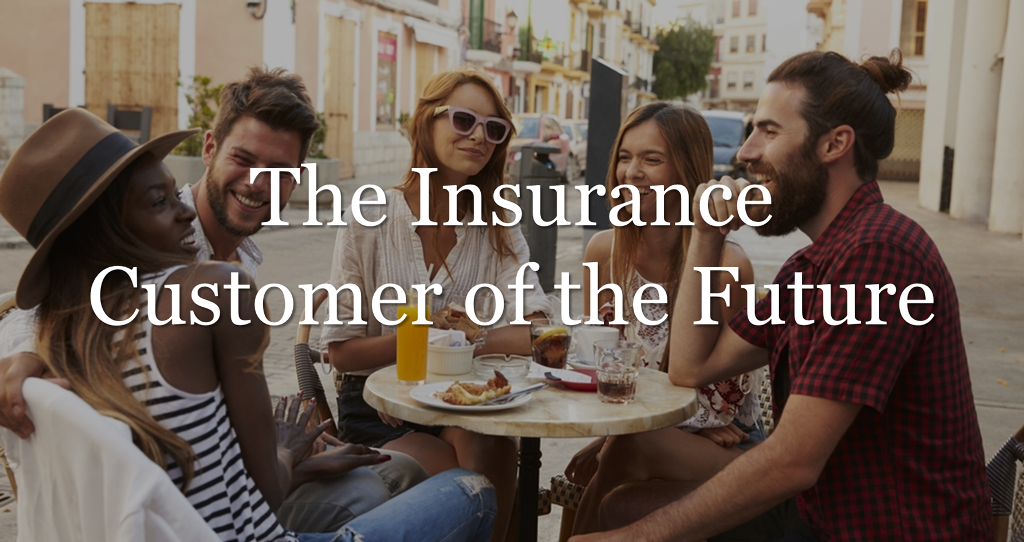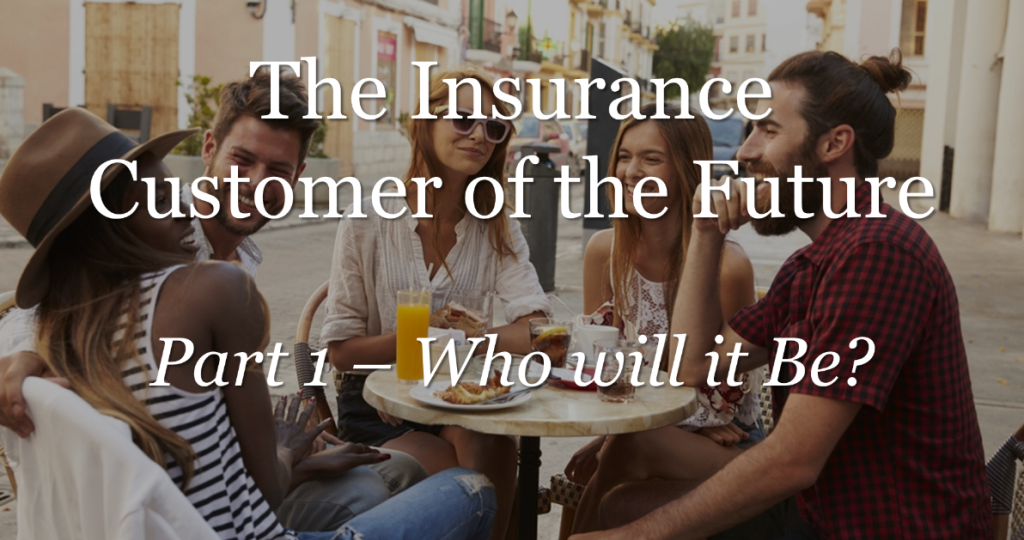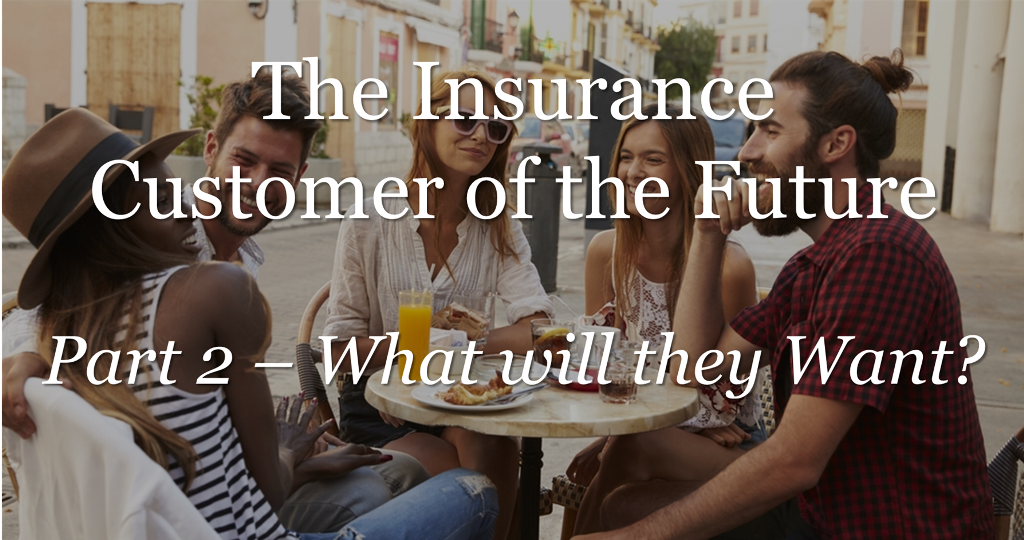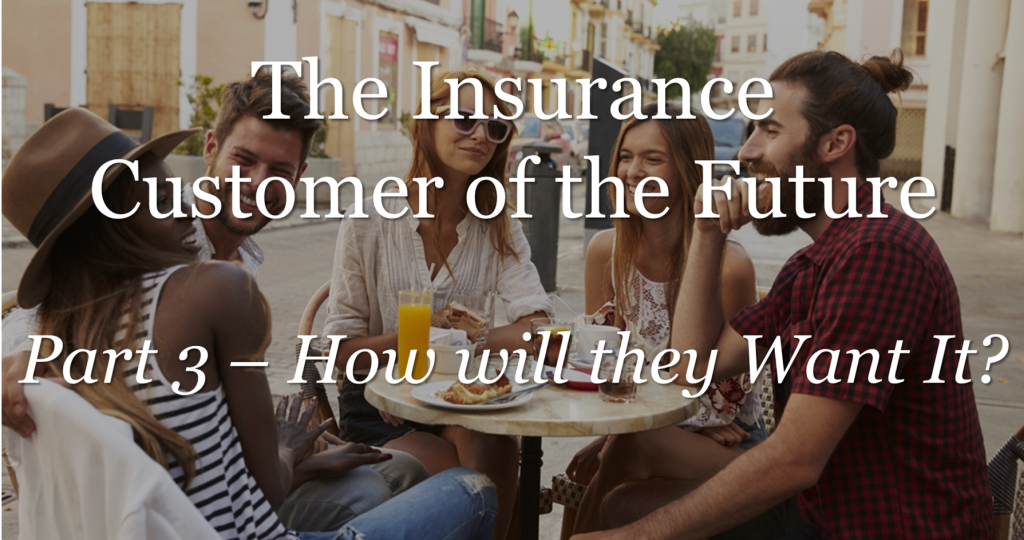

The website InsureroftheFuture.com looks at how insurers will change in response to new opportunities and changing customer demands. This microsite focuses more closely on the changing demands of insurers' customers, and looks at the Insurance Customer of the Future.
Part 1, below, looks at Who the Insurance Customer of the Future will be.
Part 2 looks at What they will Want, and part 3 considers How they will Want It.
Answers below!

We should start by acknowledging two obvious truths:
1) That there's really no such thing as an "Insurance Customer"; and that
2) The Customer of the Future is already here.
What do I mean when I say there's no such thing as an "Insurance Customer"? Just that there is a world full of customers - but they are all customers of multiple industries and sectors. No one is a customer of the insurance industry alone. And a customer's needs and demands don't miraculously change just because, in this particular instance, the customer happens to be thinking about insurance.
And how is the Customer of the Future already here? Because the Customer of the Future is what is typically called a millennial.
There's no single definition of a millennial but, as I prefer round numbers to spurious accuracy, I'm going to take it to mean those people born between 1980 and the year 2000. The first of these are now in their late 30s, and those at the tail end are still in their late teens - so we can expect this generation to be significant insurance industry customers for the next 30 to 50 years.
So who are these millennials? What are the characteristics that define them compared to prior generations? I'll highlight the four I see as most critical.
1) Smart Shoppers
Thanks to the internet and mobile technology, millennials have vastly superior access to data than previous generations. That make them very Smart Shoppers. The data asymmetry that used to exist between insurers and their customers has gone - and the chances are that your millennial customer knows more about your competitors' products and pricing than you do. If insurers don't take account of that, they're going to get surprised.
2) Lower Loyalty
The respect these customers have for longstanding institutions and brands is low. As a result, they have lower loyalty to any given provider. Just because they were your customer last year doesn't mean you're going to retain them this time around - especially if their Smart Shopping shows you're no longer the best insurer for their evolving needs. Loyalty now has to be earned through a never-ending process.
3) Self-Centered
As far as the millennial customer is concerned, the customer is king. If an insurer is to engage with them successfully, it needs to do so on their terms. Millennials also have a short attention span. So if a millennial consumer wants something from an insurer, they typically want it now - not at some point in the future. And on the rare occasions that they do want it in the future, they want it at a time and place that suits them, not the insurer.
4) Caring Consumers
But these Customers of the Future aren't entirely self-centered and fickle. At the same time as focusing hard on their own needs, millennials also have broader concerns. As a generation, millennials care more about the environment, about civil rights, and about poverty than their predecessors did. Insurers who take account of that, and who design, or re-design, their overall value proposition accordingly, will do better.

This section focuses on what the Insurance Customer of the Future will want from their providers, including their insurers, in terms of the propositions on offer and the way they are sold and serviced.
These are the trends that I see as most important for insurers to take account of.
1) Access not Assets
My son differs from me in many ways. Just one of those ways is that he doesn't have a car. He can't comprehend why anyone would bother owning something that costs a lot upfront, needs maintaining, sometimes goes wrong, and sits in the garage for probably 95% of its life.
His friends are the same. If they need transport they just 'rent' it from Uber, taxi services, public transport or, for special trips, maybe a car rental company.
Equally, this generation is less likely to own their own home, let alone a second home. They rent their main home and use AirBnB, or hotels, for vacations.
They don't care about owning the assets - as long as they have access to them when desired.
2) Gigs are Good
Nor does my son have what I, as a traditionalist, would call a 'job'. Instead he participates in multiple economic activities generating their own individual income streams. He doesn't happen to be an Uber driver by day or active on Fiverr at night - but those are the types of highly flexible 'gigs' that appeal to his generation.
My generation sees a lack of regular salary as risky. My son points out that we've got it backwards: if I lost my job I'd have no income, whereas he'd just spend more time on his other gigs.
3) Experiences Excite
As I said under Access not Assets, millennials are less interested in owning things. But that doesn't mean they don't like spending money. They just spend it differently from previous generations.
Rather than on assets, millennials spend their money on experiences: activities and adventures that they can enjoy in the moment, but whose memories will last long into the future. Probably much longer than that car or motor bike will last. When insurers develop new propositions, they need to consider the experience at least as much as the underlying product.
4) Peer to Peer
I said, under the Lower Loyalty characteristic in Part 1, that the respect these customers have for longstanding institutions and brands is low.
The flipside of that is that their respect for their peers is high. If their peers recommend a brand to them, they will take an interest. If their peers have a bad experience with a brand, then they themselves are far more likely to avoid it.
This means that managing an insurer's reputation, at a very granular segment-of-one level, becomes more important than ever.
5) Personalized Please
When I buy a coffee from Starbucks, I continue to be amazed by the degree of personalization that is on offer to their customers. At heart, all they are selling is coffee. Not so very long ago, the choices would have been with, or without, milk or sugar.
Now the customer is offered virtually any combination of type of milk, quality of milk, frothiness of milk, type of sugar, added flavors, with caffeine or not, temperature, size of cup - and even then I've probably missed a few options out.
I'm not sure whether these options were first offered because customers demanded them, or whether it was a case of 'offer it and they will come'. But one way or the other, it is changing consumers' expectations of every other product or service they are offered.
If an offering can't be personalized to their specific tastes, millennials go to someone else who can meet that need.

In this final section, I'm going to offer some thoughts on how the Insurance Customer of the Future wishes to be served.
These are the trends that I see as most important for insurers to take account of.
1) Cross-Channel
Next time you see a teenage juggling more than one device, take a good look at what they are doing. As their needs from each device change, they will switch between them. If they're using a messaging app on a tablet, but now want to check a website using that device, they can go to the messaging app on their phone and continue the conversation without pause. It just works.
And if they can seamlessly switch between devices when talking to friends, they'll expect to switch seamlessly between devices when communicating with their insurer. If they can't hop, during a conversation (or customer journey) between web, mobile, phone and email, they'll figure that the insurer doesn't deserve to be in the conversation.
Providing an omni-channel, or cross-channel, experience for them isn't a luxury - it's a necessity.
2) Forget Face-to-Face
Extending the example we just observed, you'll also notice that despite interacting with their friend (or perhaps multiple friend in parallel) that teenager is physically in the same room as you. They don't need to be face-to-face to maintain a rich interaction. That doesn't mean they'll never want to be face-to-face with their friends, but it does mean that a business that assumes they want face-to-face interaction is going to seem a little weird to them.
There will, I am sure, continue to be reasons why some insurers might want to retain an agent channel - but the provision of face-to-face experiences is unlikely to be a significant driver.
3) Scrap the Screens
If face-to-face isn't important, then what is? Over the last decade or so, the answer has been computer screens - for text, graphics, web chat or video communication.
Yet even that is now changing. Technologies such as smart glasses and virtual reality are already replacing screens with a richer, more immersive, visual experience.
And that's not the only change. Back in 1968, the film "2001: A Space Odyssey" envisaged a computer (named HAL) that responded to voice commands. At the time it seemed fantastical. Yet now, 50 years on, we have Siri, Alexa and Google all taking instructions by voice and acting on them. And the ability to engage in 'conversational commerce', rather than interacting through screens, is rapidly becoming another expectation of the millennial consumer.
4) Privacy? Pah!
The final 'how' trend I'd like to highlight is the trend away from requiring privacy.
Ironically, as legal and regulatory privacy standards continue to ratchet up (with the EU's General Data Protection Regulation, or GDPR, being but the latest example) millennials' interest in privacy is heading in the opposite direction.
Many in this generation have spent years as individual publishers, broadcasting many aspects of their own lives on Facebook, Instagram, and other social channels.
This is not a generation that has been brought up to value privacy. And, having ascribed a relatively low value to privacy, millennials are more than happy to give it up in exchange for perceived value in return. Indeed, if an insurer hasn't made use of the data that their millennial customer has made freely available to them - that customer will wonder why.